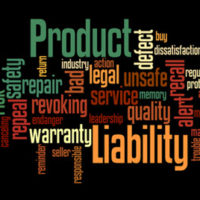11th Circuit Asked To Clarify Product Liability Law

The 11th Circuit (covering Florida) has been asked to provide an opinion on a very important product liability lawsuit involving to what extent companies who produce seat belt components can be held liable any defects that lead to accidents if the car company itself ultimately designed and approved the restraint system.
Specifically, the subsidiary of the world’s largest automotive safety supplier, Autoliv Japan, is asking the Circuit Court to affirm the lower court’s dismissal of a widow’s lawsuit over an alleged defective seat belt because, it argues, it merely provided the seat belt components to Mazda USA, which then assembled them into the restraint system that was involved in the deadly accident at issue.
Florida Product Liability Law
State product liability laws tend to define which types of companies can be held liable under their own statutes. For example, Florida law defines “product liability action” as a civil action based on a theory of strict liability, negligence, breach of warranty, nuisance, or similar theories for damages caused by the assembly, construction, design, formulation, installation, preparation, or manufacture of a product.
However, Florida also abides by the theory of contributory fault and apportionment of damages; thus, juries are instructed to consider the fault of anyone (or company) that contributed to the accident when apportioning fault. This means that more than one company or party can be found at fault for a plaintiff’s damages when it comes to product liability claims.
Arguments in Case
Here, the plaintiff is claiming that Autoliv Japan was heavily involved in the process of choosing which seat belts, specifically, would work best in the car. She also alleged that there are problems with the elements of the device as it was created in Liv’s facilities. In other words, if Autoliv did not produce defective designs for Mazda to choose from, the defective design never would have made it into the car.
Conversely, Auto Liv has responded that what matters here is who made the choice to allow a certain amount of “spool out” by the seatbelt’s torsion bar, which can be altered by the vehicle manufacturer. The case will have significant implications for statutory interpretation of product liability law in the 11th Circuit, and could very well limit or expand consumer ability to recoup damages.
Florida and Massachusetts Products Liability & Civil Litigation Lawyer
Our lives depend upon the responsible manufacturing and distribution of products like seat belts. One defect can lead to lifelong injuries or the loss of a loved one.
At the Baez Law Firm, we take irresponsible, negligent companies to court for neglecting their responsibilities in the name of profit. If you or a loved one has been injured by a product, contact us today to find out how we can help.
Resources:
courthousenews.com/11th-circuit-could-clarify-product-liability-law/
leg.state.fl.us/statutes/index.cfm?App_mode=Display_Statute&URL=0700-0799/0768/Sections/0768.81.html




















